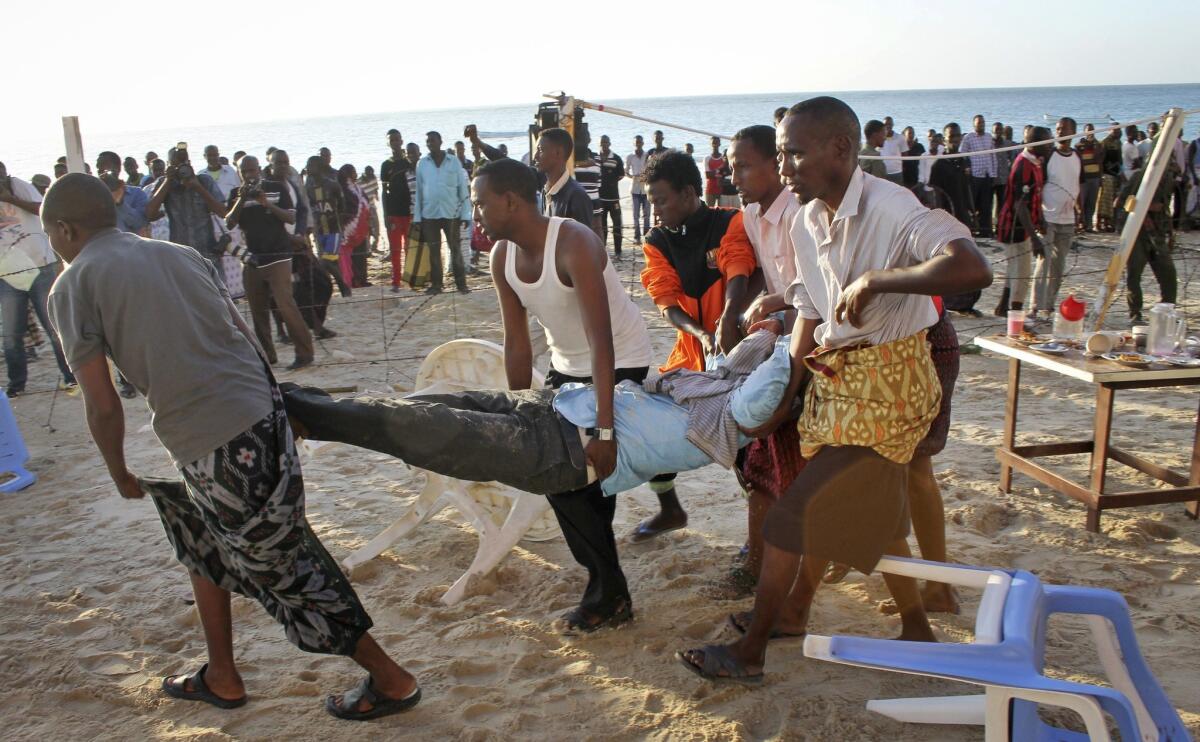After terror attack, Somalis take to Twitter to reclaim their beloved beach

Relatives carry away a dead body from the beach following Jan. 21 attack on a beachfront restaurant in Mogadishu, Somalia.
Reporting from Johannesburg, South Africa — There was one place Somalis could escape during the recent decades of terrorism, clan warfare and chaos: Liido Beach in the capital, Mogadishu, with its pure white sands and deep blue sea.
This week the beach became part of the chaos as gunmen opened fire on an oceanfront restaurant as a car bomb exploded near the entrance. The Islamic militant group Shabab is thought to be responsible for the assault, which killed 25 people.
As if raising a defiant flag, Somalis soon took to Twitter to reclaim the city’s favorite leisure spot from the terrorists. Early Friday, less than day after the attack, the hashtag #TweetLiidoPictures appeared.
“This is home, where we belong,” wrote one man, Mukhtar Nuur, who describes himself as a filmmaker.
Calling Liido “the icon for peace joy and home for us,” he tweeted an old series of photos that could have graced a travel brochure: a pink sunset, silhouettes of people walking on the beach, a smiling boy.
The tweets came from local residents and from Somalis who had joined a massive diaspora long ago.
Ismail D. Osman, a Somali businessman based in Washington, posted an old photograph of a soccer game on the beach. “Where girls can play football,” he wrote.
The old photographs were a sharp contrast to the images that appeared in news reports after the terrorist attack: a man weeping beside a dead woman, a head shawl soaked with blood, bodies neatly lined up on the sand, covered with what appeared to be the distinctive yellow tablecloths from the Liido Seafood Restaurant.
Somalia’s national security agency said the dead included a 6-year-old, a 4-year-old, six women, a group of university students and hotel workers. All the immediate members of one family were killed, according to Mohamed Bashle, youth activist and radio personality, who was at the restaurant during the attack.
Authorities said there were about 100 survivors at the restaurant.
Shabab called the television network Al Jazeera to claim responsibility for the attack, the network reported.
The terrorist group emerged from an Islamic order that toppled the warlords who once ruled Mogadishu. It took control of the capital after 2006 and enforced an extreme version of Islamic law. Religious police patrolled the streets, and it was illegal to play soccer or listen to music.
A coalition of African forces drove Shabab from Mogadishu in 2011, but the group has retained parts of the countryside and has launched attacks on capital and other regions almost weekly. Universities, restaurants and cafes are common targets.In November, Shabab militants killed 15 people at a Mogadishu hotel.
Despite a recent series of U.S. air strikes that killed several leaders, the group has also targeted bases of the African coalition, including an attack last week in southern Somalia that it claims killed 100 Kenyan soldiers.The Kenyan government has not confirmed that figure.
Its most notorious attacks have been in Kenya: the 2013 Westgate shopping mall attack that killed 67 and last year’s attack on a university campus that killed 14.
A day after the attack at Liido Beach, at least a few people were already strolling along the shoreline again as investigators assessed the scene, according to video posted by Bashle.
It was still far less busy than a typical Friday. The tweets, however, kept coming.
Abdirashid Muse, who describes himself as an activist and “future leader” posted a photograph of Liido on a crowded day, with hundreds of people frolicking in the sea on a sunny day. Terrorist attacks will “only strengthened our resolve,” he wrote.
One user retweeted a photograph that had been posted Jan. 1 by a legislator, Abdulkadir Hashi. It showed him eating lunch at Liido Seafood Restaurant. A waiter carried coffees to one table, while another patron gazed across sand at the ocean.
“Unspoiled, stunning beauty! Come and see it,” it said.
“Mogadishu is safe now?” another Twitter user responded at the time.
“As safe as any other major city in the world,” Hashi answered. “Almost!”
Follow @RobynDixon_LAT for news from Africa
ALSO
Wave of violence shakes Boyle Heights church community
Carson Mayor Albert Robles upset by how Chargers and Raiders treated the city
Man is suspected of attacking his wife and killing 2 of his nephews in Arcadia
More to Read
Sign up for Essential California
The most important California stories and recommendations in your inbox every morning.
You may occasionally receive promotional content from the Los Angeles Times.









